后缀判断词性
由英语单词后缀判定词性

由英语单词后缀判定词性后是一种重要的构法,通后常常可以判断出一个的性。
一个英可以分三个局部:前〔 prefix〕,根〔 stem〕及后〔 suffix 〕。
中位于根前面的局部就是前。
前,可以改的意思。
在言学里,后,又称尾,是一种后置于其他素后的。
后 -名解以英例: establish〔〕 + -ment 〔后〕— > establishment 〔名〕:借由后 -ment 的使用,使原本的素名,言的衍生,是后的一种用途后 -名后常的此后及其具体含如下:1.-ster,-eer,-er〔or 〕意:从事某种或参与某种活的人〔person engaged in anoccupation or activity 〕例:gamester ,gangster,songster,engineer ,profiteer ,mountaineer ,auctioneer ,driver , teacher ,director , actor , professor2.-let 意:小或者不重要的西〔small,unimportant things 〕例: booklet ,leaflet ,starlet3.-ette 意:1〕小的西〔 small〕例:cigarette 2 〕假的西〔 imitation 〕例:leatherette3〕女性〔 female 〕例:usherette4. -ess 意:女性〔 female 〕例: actress, poetess, hostess, paintress5. -hood 意:期〔 status; etc .〕例: boyhood , childhood , manhood6. -ship 意:才能,状,格,品等〔skill, state, condition , status, quality 〕例: leadership , friendship , membership , lectureship ,sportsmanship7.-ful 意:量〔 the amount which noun contains 〕例: cupful , handful , mouthful , spoonful8.-tion ,-ion 意: 1〕状,行等〔 state;action ;etc.〕例: action ,oppression ,possession,education ,starva- tion 2 〕机构等〔institution ;etc.〕例: organization ,foundation 9.-ment 意:状,行等〔state; action; etc.〕例: movement ,enslavement ,pavement10. -al 意:作〔 action 〕例: arrival , refusal, revival , recital , removal11.-age 意:程度,数量等〔extent ; amount ;etc.〕例:wastage,coverage, acreage,shrinkage,breakage, hostage912.-ness;-ity〔 ty〕意:状,品〔 state;quality ;etc .〕例:happiness, usefulness,selfishness,kindness ,rapidity , activity , sanity , changeability13.-ism 意:道,主,学等〔 doctrine of ,practice of 〕例:idealism , impressionism ,absenteeism ,racism后 -后常的此后及其具体含如下:1.-ify 意:,〔 to turn into ,to make or become 〕例: beautify , diversify , simplify2.-ize;-en 意:使⋯⋯,得⋯⋯〔 to make or become;to make into〕例:modernize,popularize , legalize, hospitalize ,symbolize, ripen ,widen , heighten , threaten3.-ate 意:增加,使⋯⋯听写〔 give or add,make or become 〕例:originate , hydrogenate , validate ,differentiate后 -形容后常的此后及其具体含如下:1.-ful 意:充,有〔 full of ;hav- ing;giving;etc.〕例: useful ,pitiful , hopeful ,careful,helpful , forgetful ,thankful , fearful2. -less 意:没有,无〔without ; not giving 〕例: speechless, childless,harmless,hopeless, meaningless ,homeless3.-ly 意:有⋯⋯品的〔having the qualities of 〕例: beastly,manly , brotherly ,friendly4. -like 意:像⋯⋯的〔like〕例:childlike , statesmanlike ,tiger-like5. -y; -ish 意:像⋯⋯一般的〔somewhat like 〕例: meaty , sandy, silky, hairy,leafy, watery , foolish , girlish ,blackish , thinnish6.-some 意:像⋯⋯一的;引起⋯⋯的;有⋯⋯品的〔 like;causing; having thequality of 〕例: troublesome , burdensome , wholesome , tiresome , bothersome 7.-able〔ible 〕意:能⋯⋯的;可以⋯⋯的〔 able to be ;capable〕例: changeable,realiable,readable , drinkable , comfortable ,expansible ,convincible8.-ed 意:有⋯⋯的〔 having,etc.〕例: wooded ,pointed ,moneyed , odd-shaped9.-al 意:有⋯⋯属性的,⋯⋯型的〔 nature of ,typical of 〕例: cultural ,personal,regional ,musical10. -ary〔 ory〕意:属于⋯⋯的,与⋯⋯相的〔: revolutionary , imaginary , contradictory 11. -ous 意:富含⋯⋯的;有⋯⋯品的;像⋯⋯的〔belonging to; connected with 〕例 fullof ; having the quality of ;like〕例: glorious,erroneous , malicious , gracious12.-ic〔 ical〕意:⋯⋯的;属于⋯⋯的〔 typical of ;belonging to 〕例: historic , historical , methodic ,methodical , dramatic , heroic13. -ive 意:有⋯⋯属性的;有某种向的〔having the nature or quality of;given or tending to 〕例: attractive , talkative , restrictive , defensive , preventive ,constructive , sensitive后 -副后常的此后及其具体含如下:1. -ly 意:以⋯⋯方式〔in a...manner ; etc.〕例: happily, boldly , attentive- ly ,strangely2.-ward〔 s〕意:表示方式或作的方向〔manner and direction of movement〕例:onward 〔 s〕, backward 〔s〕, earthward 〔 s〕, homeward 〔 s〕, eastward 〔 s〕3.-wise 意: 1〕按照⋯⋯方式〔 in the manner of 〕例: crabwise,clockwise2〕就⋯⋯而言〔 asfar as ...is concerned〕例: weatherwise,educationwise4.以 ly 后尾的副,比都是 +more ,如 more carefully ,more useful 最高 +most如 most carefully ,most useful。
英语词汇词性辨析方法
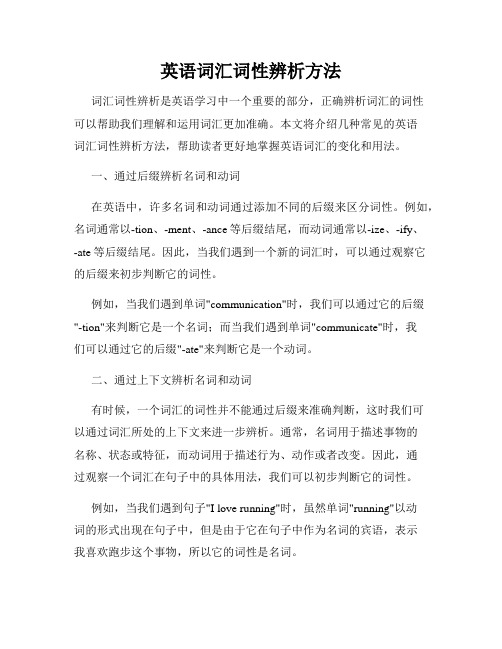
英语词汇词性辨析方法词汇词性辨析是英语学习中一个重要的部分,正确辨析词汇的词性可以帮助我们理解和运用词汇更加准确。
本文将介绍几种常见的英语词汇词性辨析方法,帮助读者更好地掌握英语词汇的变化和用法。
一、通过后缀辨析名词和动词在英语中,许多名词和动词通过添加不同的后缀来区分词性。
例如,名词通常以-tion、-ment、-ance等后缀结尾,而动词通常以-ize、-ify、-ate等后缀结尾。
因此,当我们遇到一个新的词汇时,可以通过观察它的后缀来初步判断它的词性。
例如,当我们遇到单词"communication"时,我们可以通过它的后缀"-tion"来判断它是一个名词;而当我们遇到单词"communicate"时,我们可以通过它的后缀"-ate"来判断它是一个动词。
二、通过上下文辨析名词和动词有时候,一个词汇的词性并不能通过后缀来准确判断,这时我们可以通过词汇所处的上下文来进一步辨析。
通常,名词用于描述事物的名称、状态或特征,而动词用于描述行为、动作或者改变。
因此,通过观察一个词汇在句子中的具体用法,我们可以初步判断它的词性。
例如,当我们遇到句子"I love running"时,虽然单词"running"以动词的形式出现在句子中,但是由于它在句子中作为名词的宾语,表示我喜欢跑步这个事物,所以它的词性是名词。
三、通过词义辨析形容词和副词形容词用于修饰名词,描述事物的特征或状态,而副词用于修饰动词、形容词或其他副词,描述行为的方式、程度或频率。
因此,通过观察一个词汇在句子中所起的修饰作用,我们可以初步判断它的词性。
例如,当我们遇到句子"She sings beautifully"时,单词"beautifully"用于修饰动词"sings",描述她的歌唱方式,所以它的词性是副词。
英语后缀词性
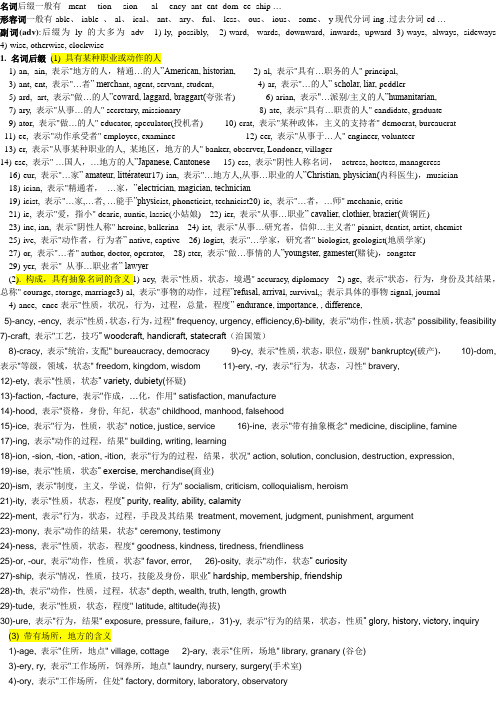
名词后缀一般有-ment -tion -sion - al -ency -ant -ent -dom -ee -ship …形容词一般有-able、-iable 、-al、-ical、-ant、-ary、-ful、-less、-ous、-ious、-some、-y现代分词-ing .过去分词-ed …副词(adv):后缀为ly的大多为adv1)-ly, possibly, 2)-ward, -wards, downward, inwards, upward 3)-ways, always, sideways 4)-wise, otherwise, clockwise1. 名词后缀(1) 具有某种职业或动作的人1)-an, -ain, 表示"地方的人,精通…的人”American, historian,2)-al, 表示"具有…职务的人" principal, 3)-ant,-ent, 表示"…者” merch ant, agent, servant, student, 4)-ar, 表示"…的人” scholar, liar, peddler 5)-ard, -art, 表示"做…的人”coward, laggard, braggart(夸张者) 6)-arian, 表示"…派别/主义的人”humanitarian, 7)-ary, 表示"从事…的人" secretary, missionary 8)-ate, 表示"具有…职责的人" candidate, graduate 9)-ator, 表示"做…的人" educator, speculator(投机者) 10)-crat, 表示"某种政体,主义的支持者" democrat, bureaucrat 11)-ee, 表示"动作承受者" employee, examinee 12)-eer, 表示"从事于…人" engineer, volunteer13)-er, 表示"从事某种职业的人, 某地区,地方的人" banker, observer, Londoner, villager14)-ese, 表示" …国人,…地方的人”Japanese, Cantonese15)-ess, 表示"阴性人称名词,actress, hostess, manageress 16)-eur, 表示"…家” amateur, littérateur17)-ian, 表示"…地方人,从事…职业的人”Christian, physician(内科医生),musician18)-ician, 表示"精通者,…家,”electrician, magician, technician19)-icist, 表示"…家,…者, …能手”physi cist, phoneticist, technicist20)-ic, 表示"…者,…师" mechanic, critic 21)-ie, 表示"爱,指小" dearie, auntie, lassie(小姑娘) 22)-ier, 表示"从事…职业” cavalier, clothier, brazier(黄铜匠) 23)-ine, ian, 表示"阴性人称" heroine, ballerina 24)-ist, 表示"从事…研究者,信仰…主义者" pianist, dentist, artist, chemist 25)-ive, 表示"动作者,行为者” native, captive 26)-logist, 表示"…学家,研究者" biologist, geologist(地质学家) 27)-or, 表示"…者" author, doctor, operator, 28)-ster, 表示"做…事情的人”youngster, gamester(赌徒),songster 29)-yer, 表示" 从事…职业者” lawyer(2). 构成,具有抽象名词的含义1)-acy, 表示"性质,状态,境遇" accuracy, diplomacy 2)-age, 表示"状态,行为,身份及其结果,总称" courage, storage, marriage3)-al, 表示"事物的动作,过程”refusal, arriva l, survival,; 表示具体的事物signal, journal4)-ance, -ence表示"性质,状况,行为,过程,总量,程度” endurance, importance, , difference,5)-ancy, -ency, 表示"性质,状态,行为,过程" frequency, urgency, efficiency,6)-bility, 表示"动作,性质,状态" possibility, feasibility7)-craft, 表示"工艺,技巧” woodcraft, handicraft, statecraft(治国策)8)-cracy, 表示"统治,支配" bureaucracy, democracy 9)-cy, 表示"性质,状态,职位,级别" bankruptcy(破产),10)-dom,表示"等级,领域,状态" freedom, kingdom, wisdom 11)-ery, -ry, 表示"行为,状态,习性" bravery,12)-ety, 表示"性质,状态” variety, dubiety(怀疑)13)-faction, -facture, 表示"作成,…化,作用" satisfaction, manufacture14)-hood, 表示"资格,身份, 年纪,状态" childhood, manhood, falsehood15)-ice, 表示"行为,性质,状态" notice, justice, service 16)-ine, 表示"带有抽象概念" medicine, discipline, famine17)-ing, 表示"动作的过程,结果" building, writing, learning18)-ion, -sion, -tion, -ation, -ition, 表示"行为的过程,结果,状况" action, solution, conclusion, destruction, expression,19)-ise, 表示"性质,状态” exercise, mercha ndise(商业)20)-ism, 表示"制度,主义,学说,信仰,行为" socialism, criticism, colloquialism, heroism21)-ity, 表示"性质,状态,程度” purity, reality, ability, calamity22)-ment, 表示"行为,状态,过程,手段及其结果treatment, movement, judgment, punishment, argument23)-mony, 表示"动作的结果,状态" ceremony, testimony24)-ness, 表示"性质,状态,程度" goodness, kindness, tiredness, friendliness25)-or, -our, 表示"动作,性质,状态" favor, error, 26)-osity, 表示"动作,状态” curiosity27)-ship, 表示"情况,性质,技巧,技能及身份,职业” hardship, membership, friendship28)-th, 表示"动作,性质,过程,状态" depth, wealth, truth, length, growth29)-tude, 表示"性质,状态,程度" latitude, altitude(海拔)30)-ure, 表示"行为,结果" exposure, pressure, failure,,31)-y, 表示"行为的结果,状态,性质” glory, history, victory, inquiry (3) 带有场所,地方的含义1)-age, 表示"住所,地点" village, cottage 2)-ary, 表示"住所,场地" library, granary (谷仓)3)-ery, ry, 表示"工作场所,饲养所,地点" laundry, nursery, surgery(手术室)4)-ory, 表示"工作场所,住处" factory, dormitory, laboratory, observatory(4) 带有学术,科技含义1)-grapy, 表示"…学,写法” biog raphy, calligraphy, geography 2)-ic, ics, 表示"…学…法" logic, mechanics, optics, electronics 3)-ology, 表示"…学…论”biology, zoology, technology(工艺学) 4)-nomy, 表示"…学…术" astronomy, economy, bionomy(生态学5)-ery, 表示"学科,技术" chemistry, cookery, machinery 6)-y, 表示"…学,术,法” photography, philosophy (5) 表示人和事物的总和,集合含义1)-age, baggage, tonnage 2)-dom, newspaperdom(新闻界) 3)-hood, neighbourhood, womanhood 4)-ery, cavalry, ministry(内阁) 5)-ure, legislature, judicature(6) 表示物品和物质名称的含义1)-ant, ent, solvent, constant 2)-al, signal, pictorial(画报) 3)ar, collar, pillar(石柱)4)- er, boiler, computer, washer, cooker 5)-ery, drapery(绸缎) 6)-ing, clothing, matting,7)-ment, instrument, equipment, attachment(7) 表示“细小”的含义1)-cle, particle, 2)-cule, molecule(分子) 3)-el, parcel 4)-en, chicken, maiden 5)-et, pocket, ticket6)-etta, -ette, etto, cigarette, essayette(短文) 7)-kin, napkin 8)-ling, duckling, 9)-let, booklet 10)-y, baby, doggy 2. 形容词后缀(1)带有“属性,倾向,相关”的含义1)-able, -ible, movable, comfortable, 2)-al, natural, additional, educational 3)-an, ane, urban, suburban, republican 4)-ant, -ent, distant, important, excellent 5)-ar, similar, popular, regular 6)-ary, military, voluntary7)-ice, -atie, ical, politic, systematic, historic, physical, 8)-ine, masculine, feminine, marine 9)-ing, moving, touching, daring 10)-ish, foolish, bookish, selfish 11)-ive, active, impressive, decisive 12)-ory, satisfactory, compulsory 13)-il, -ile, -eel, fragile, genteel(文雅的)(2) 表示“相象,类似”的含义1)-ish, boyish, childish 2)-esque, picturesque 3)-like, manlike, childlike4)-ly, manly, fatherly, scholarly, motherly 5)-some, troublesome, handsome 6)-y, milky, pasty(3) 表示“充分的”含义1)-ful, beautiful, wonderful, helpful, truthful 2)-ous, dangerous, generous, courageous, various 3)-ent, violent (4) 表示由某种物质形成,制成或生产的含义1)-en, wooden, golden, woolen 2)-ous, gaseous 3)-fic, scientific(5) 表示方向的含义1)-ern, eastern, western 2)-ward, downward, forward(6) 表示“倍数”的含义1)-ble, double, treble 2)ple, triple 3)-fold, twofold, tenfold(7) 表示“数量关系”的含义1)-teen, thirteen 2)-ty, fifty 3)-th, fourth, fiftieth(8) 表示国籍,语种,宗教的含义1)-an, Roman, European 2)-ese, Chinese, 3)-ish, English, Spanish(9) 表示“比较程度”的含义1)-er, greater 2)-ish, reddish, yellowish 3)-est, highest 4)-most, foremost, topmost(10)其他的含义: -less, 表示否定,countless, stainless, wireless3. 动词后缀1)-ize, ise, 表示"做成,变成,…化“modernize, mechanize, democratize, organize2)-en, 表示"使成为,引起,使有” quicken, weaken, soften, harden3)-ify, 表示"使…化, 使成”beautify, purify, intensify, signify, simplify4)-ish, 表示"使,令” finish, abolish, diminish, establish5)-ate, 表示“成为…,处理,作用” separate, operate, indicate。
词性转换
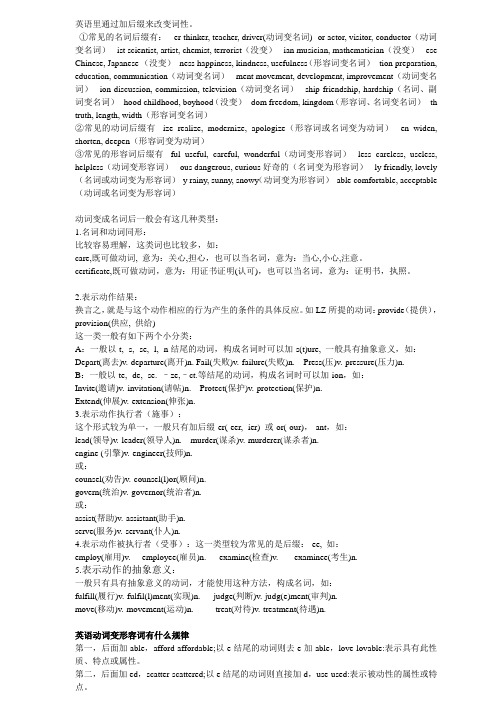
英语里通过加后缀来改变词性。
①常见的名词后缀有:-er thinker, teacher, driver(动词变名词) -or actor, visitor, conductor(动词变名词)-ist scientist, artist, chemist, terrorist(没变)-ian musician, mathematician(没变)-ese Chinese, Japanese (没变)-ness happiness, kindness, usefulness(形容词变名词)-tion preparation, education, communication(动词变名词)-ment movement, development, improvement(动词变名词)-ion discussion, commission, television(动词变名词)-ship friendship, hardship(名词、副词变名词)-hood childhood, boyhood(没变)-dom freedom, kingdom(形容词、名词变名词)-th truth, length, width(形容词变名词)②常见的动词后缀有-ize realize, modernize, apologize(形容词或名词变为动词)-en widen, shorten, deepen(形容词变为动词)③常见的形容词后缀有-ful useful, careful, wonderful(动词变形容词)-less careless, useless, helpless(动词变形容词)-ous dangerous, curious好奇的(名词变为形容词)-ly friendly, lovely (名词或动词变为形容词)-y rainy, sunny, snowy(动词变为形容词)-able comfortable, acceptable (动词或名词变为形容词)动词变成名词后一般会有这几种类型:1.名词和动词同形:比较容易理解,这类词也比较多,如:care,既可做动词, 意为:关心,担心,也可以当名词,意为:当心,小心,注意。
英语单词词性和判断技巧(2)

英语单词词性词性尾缀其实很多,大家主要记住最常用的1. 名词后缀1)-or/er/ess/crat/cis:做某件事情或职业的人或物:worker, debtor2)-acy, 表示"性质,状态,境遇" democr acy, accura cy, diplom acy3)-ance, -ence表示"性质,状况,行为,过程,总量,程度” import ance, dilige nce, differ ence, obedie nce4)-ancy, -ency, 表示"性质,状态,行为,过程" freque ncy, urgenc y, effici ency,5)-bility, 表示"动作,性质,状态" possib ility, flexib ility, feasib ility,6)-dom, 表示"等级,领域,状态" freedo m, kingdo m, wisdom7)-hood, 表示"资格,身份, 年纪,状态" childh ood, manhoo d, falseh ood8)-ion, -sion, -tion, -ation, -ition,表示"行为的过程,结果,状况" action, soluti on, conclu sion, destru ction, expres sion, correc tion9)-ism, 表示"制度,主义,学说,信仰,行为" social ism, critic ism, colloq uiali sm, herois m10)-ity, 表示"性质,状态,程度” purity, realit y, abilit y, calami ty11)-ment, 表示"行为,状态,过程,手段及其结果 treatm ent, moveme nt, judgme nt, punish ment, argume nt12)-ness, 表示"性质,状态,程度" goodne ss, kindne ss, tiredn ess, friend lines s13)-ship, 表示"情况,性质,技巧,技能及身份,职业” hardsh ip, member ship, friend ship14)-th, 表示"动作,性质,过程,状态" depth, wealth, truth, length, growth15)-tude, 表示"性质,状态,程度" latitu de, altitu de(海拔)16)-ure, 表示"行为,结果" exposu re, pressu re, failur e, proced ure(手续),17-grapy,表示"……学,写法” biogra phy, callig raphy, geogra phy18)-ic, ics, 表示"……学……法" logic, mechan ics, electr onics, lingui stics19)-ology,表示"……学……论”biolog y, zoolog y, techno logy(工艺学)20)-nomy, 表示"……学……术" astron omy, econom y, bionom y(生态学)2. 形容词后缀(1)带有“属性,倾向,相关”的含义1)-able, -ible, visibl e, flexib le2)名词-ish, foolis h, bookis h, selfis h(注意accomplis h, vanish)3)-ive, active, sensit ive, produc tive4)-like, manlik e, childl ike5)名词-ly, manly, father ly, schola rly, mother ly6)-some, troubl esome, handso me7)-ful, beauti ful, wonder ful, helpfu l, truthf ul8)-ous, danger ous, genero us, courag eous, variou s9)-ent, violen t10)-most, foremo st, topmos t11)less, 表示否定,countl ess, stainl ess, wirele ss3. 动词后缀1)-ize, ise, 表示"做成,变成,……化“modern ize, mechan ize, democr atize, organi ze2)-en, 表示"使成为,引起,使有” quicke n, weaken, soften, harden3)-fy, 表示"使……化, 使成”beauti fy, purify, intens ify, signif y, simpli fy4)-ish, 表示"使,令” finish, abolis h, dimini sh, establ ish5)-ate, 表示“成为……,处理,作用” separa te, operat e, indica te4. 副词后缀(形容词)-ly:bad→badly坏地/恶劣地,carefu l→carefu lly小心地-wise(OE):clock→clockw ise(a./adv.)顺时针方向的(地);like→likewi se同样地-wards:out→outwar ds向外面地,north→northw ards向北方地单词词性判断可以在词义的理解及书写句子方面帮助学生。
后缀的用法及意义

后缀的用法及意义后缀是指附加在词根后面的一个或多个字母,并且通常具有一定的语法意义。
后缀可以改变一个词的词性、时态、语气、数量以及意义,是构成新词的重要手段。
本文将围绕后缀的用法及意义展开,讨论后缀的分类、作用、举例以及常见错误用法等。
一、后缀的分类及功能1. 后缀的分类后缀可以按照其功能和性质进行分类,一般可以分为名词性后缀、形容词性后缀、动词性后缀和副词性后缀。
名词性后缀主要用于构成名词,常见的有"-er"、"-ist"、"-ment"等;形容词性后缀主要用于构成形容词,常见的有"-able"、"-ful"、"-ish"等;动词性后缀主要用于构成动词,常见的有"-en"、"-ize"、"-ate"等;副词性后缀主要用于构成副词,常见的有"-ly"、"-ward"、"-wise"等。
这些后缀根据其构成的词性不同,具有不同的功能和意义。
2. 后缀的功能后缀的功能主要包括构词、改变词性、表示时态、语气、数量以及意义等。
通过添加不同的后缀,可以使词的含义更加丰富,同时也可以使句子更具表达力和准确性。
二、后缀的用法及意义1. 名词性后缀的用法及意义名词性后缀主要用于构成名词,可以表示人或物的性质、属性、行为、状态等。
常见的名词性后缀包括"-er"、"-ist"、"-ment"、"-tion"等。
根据后缀"-er"构成的名词表示人或物的性质或从事某种行为的人,如"teacher"(老师)、"singer"(歌手);根据后缀"-ist"构成的名词表示某种专业领域的从业人员或信仰者,如"artist"(艺术家)、"scientist"(科学家);根据后缀"-ment"构成的名词表示行为、状态或结果,如"development"(发展)、"enjoyment"(享乐);根据后缀"-tion"构成的名词表示动作、过程或状态,如"education"(教育)、"contribution"(贡献)。
英语词性后缀
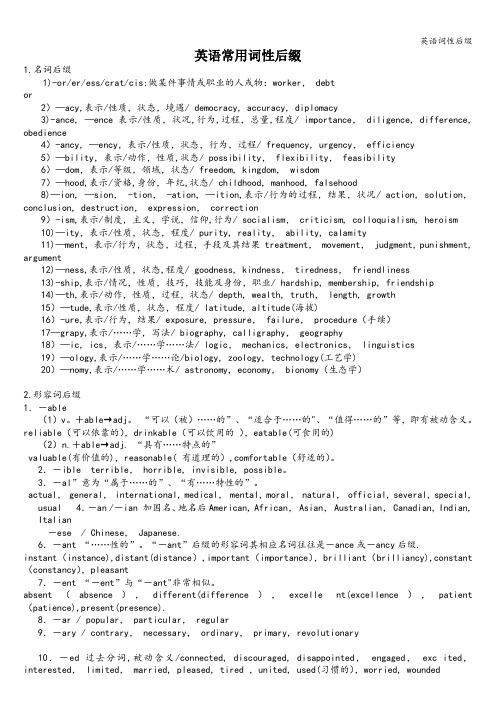
英语常用词性后缀1.名词后缀1)-or/er/ess/crat/cis:做某件事情或职业的人或物:worker, debtor2)—acy,表示/性质,状态,境遇/ democracy, accuracy, diplomacy3)-ance, —ence表示/性质,状况,行为,过程,总量,程度/ importance, diligence, difference, obedience4)-ancy, —ency,表示/性质,状态,行为,过程/ frequency, urgency, efficiency5)—bility,表示/动作,性质,状态/ possibility, flexibility, feasibility6)—dom,表示/等级,领域,状态/ freedom, kingdom, wisdom7)—hood,表示/资格,身份,年纪,状态/ childhood, manhood, falsehood8)—ion, —sion, -tion, -ation, —ition,表示/行为的过程,结果,状况/ action, solution,conclusion, destruction, expression, correction9)-ism,表示/制度,主义,学说,信仰,行为/ socialism, criticism, colloquialism, heroism10)—ity,表示/性质,状态,程度/ purity, reality, ability, calamity11)—ment,表示/行为,状态,过程,手段及其结果 treatment, movement, judgment, punishment, argument12)—ness,表示/性质,状态,程度/ goodness, kindness, tiredness, friendliness13)-ship,表示/情况,性质,技巧,技能及身份,职业/ hardship, membership, friendship14)—th,表示/动作,性质,过程,状态/ depth, wealth, truth, length, growth15)—tude,表示/性质,状态,程度/ latitude, altitude(海拔)16)-ure,表示/行为,结果/ exposure, pressure, failure, procedure(手续)17—grapy,表示/……学,写法/ biography, calligraphy, geography18)—ic, ics,表示/……学……法/ logic, mechanics, electronics, linguistics19)—ology,表示/……学……论/biology, zoology, technology(工艺学)20)—nomy,表示/……学……术/ astronomy, economy, bionomy(生态学)2.形容词后缀1.-able(1)v。
英语基础知识点判断英语词性及发音的方法整理
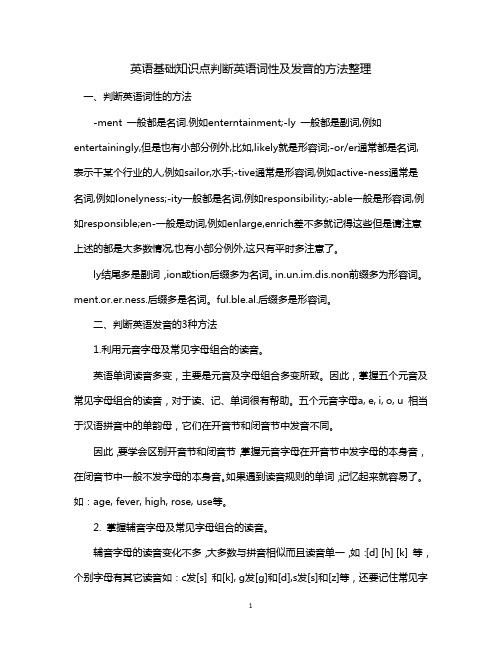
英语基础知识点判断英语词性及发音的方法整理一、判断英语词性的方法-ment 一般都是名词.例如enterntainment;-ly 一般都是副词,例如entertainingly,但是也有小部分例外,比如,likely就是形容词;-or/er通常都是名词,表示干某个行业的人,例如sailor,水手;-tive通常是形容词,例如active-ness通常是名词,例如lonelyness;-ity一般都是名词,例如responsibility;-able一般是形容词,例如responsible;en-一般是动词,例如enlarge,enrich差不多就记得这些但是请注意上述的都是大多数情况,也有小部分例外,这只有平时多注意了。
ly结尾多是副词,ion或tion后缀多为名词。
in.un.im.dis.non前缀多为形容词。
ment.or.er.ness.后缀多是名词。
ful.ble.al.后缀多是形容词。
二、判断英语发音的3种方法1.利用元音字母及常见字母组合的读音。
英语单词读音多变,主要是元音及字母组合多变所致。
因此,掌握五个元音及常见字母组合的读音,对于读、记、单词很有帮助。
五个元音字母a, e, i, o, u 相当于汉语拼音中的单韵母,它们在开音节和闭音节中发音不同。
因此,要学会区别开音节和闭音节,掌握元音字母在开音节中发字母的本身音,在闭音节中一般不发字母的本身音。
如果遇到读音规则的单词,记忆起来就容易了。
如:age, fever, high, rose, use等。
2. 掌握辅音字母及常见字母组合的读音。
辅音字母的读音变化不多,大多数与拼音相似而且读音单一,如:[d] [h] [k] 等,个别字母有其它读音如:c发[s] 和[k], g发[g]和[d],s发[s]和[z]等,还要记住常见字母组合的读音,如sh发[∫],ch发[ts],tr发[tr],dr发[dr],ck发[k]等。
3. 掌握划分音节的方法记忆长单词。
通过词缀判断词性

~less表示否定, eg:homeless
servile---奴性的
名词 Missile---miss发送+ ile物体----导弹 Textile---text(编织)+ile----纺织品
Automobile Domicile--dom(dormitory)----住宅,住所
同时具有形容词与动词含义 的后缀-ish
1)具有...性质的(通常为贬义) bookish书呆子气的 辨析:childish, childly, childlike manish, manly, manlike 2)稍微的 coldish, yellowish偏黄的 3)语言 English, Finish, Spanish 4)动词 establish, diminish使缩小,vanish消失, flourish使 繁荣,使兴旺
many relatives. ----by Bernard Shaw
-ant 形容词:ignorant, assistant辅助的, 副的, attendant 伴随的, 随之而产生的 buoyant----buoy(浮标,救生圈) + ant----有浮力 的, 轻快的
名词:examinant主考官, applicant申请者, servant, participant attendant服务人员
~like表示像, eg:humanlike
~logical表示学科的, eg:biological
后缀的名词解释
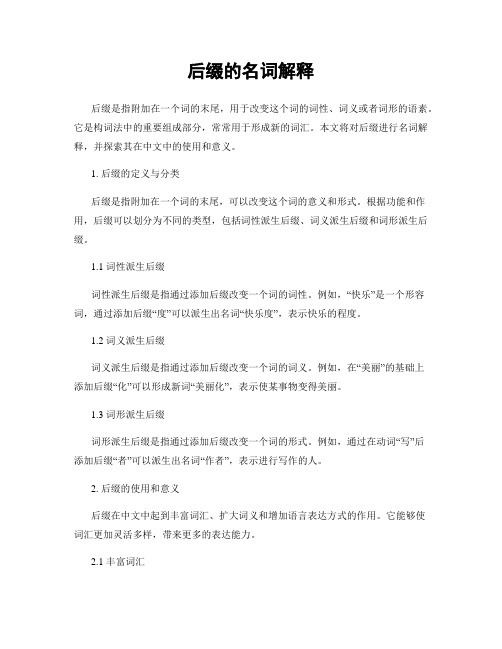
后缀的名词解释后缀是指附加在一个词的末尾,用于改变这个词的词性、词义或者词形的语素。
它是构词法中的重要组成部分,常常用于形成新的词汇。
本文将对后缀进行名词解释,并探索其在中文中的使用和意义。
1. 后缀的定义与分类后缀是指附加在一个词的末尾,可以改变这个词的意义和形式。
根据功能和作用,后缀可以划分为不同的类型,包括词性派生后缀、词义派生后缀和词形派生后缀。
1.1 词性派生后缀词性派生后缀是指通过添加后缀改变一个词的词性。
例如,“快乐”是一个形容词,通过添加后缀“度”可以派生出名词“快乐度”,表示快乐的程度。
1.2 词义派生后缀词义派生后缀是指通过添加后缀改变一个词的词义。
例如,在“美丽”的基础上添加后缀“化”可以形成新词“美丽化”,表示使某事物变得美丽。
1.3 词形派生后缀词形派生后缀是指通过添加后缀改变一个词的形式。
例如,通过在动词“写”后添加后缀“者”可以派生出名词“作者”,表示进行写作的人。
2. 后缀的使用和意义后缀在中文中起到丰富词汇、扩大词义和增加语言表达方式的作用。
它能够使词汇更加灵活多样,带来更多的表达能力。
2.1 丰富词汇通过添加不同的后缀,可以衍生出大量的新词。
这些新词能够集中表达某种特定的含义,丰富了词汇量,使人们能够更准确、更具体地表达观点和意思。
例如,通过在名词“跳”的后面添加后缀“者”,就可以得到名词“跳者”,指跳舞的人。
2.2 扩大词义后缀的加入可以扩大词义,让一个词的范围更加广泛。
不同的后缀可以赋予词语不同的含义。
例如,在名词“逃跑”的基础上加上后缀“者”,就可以得到名词“逃跑者”,可以指逃离困境的人,也可以指逃离责任的人。
2.3 增加语言表达方式后缀的使用可以增加语言的表达方式,让人们在表达思想和意见时更加丰富多样。
通过在动词后面添加后缀“性”,可以将动词转化为形容词,表示某种性质或特征。
例如,“缓慢”是一个形容词,通过在动词“行走”的后面添加后缀“性”,可以得到“行走性”,表示行走的特性或方式。
英语单词词根词缀和词性转换 英语单词词性转换的基本规律

英语单词词性转换的基本规律.动词(v.)→名词(n.)(a)词形不变,词性改变例如:work, study, water, plant等可以用作动词(工作,学习,浇水,种植),也可以用作名词(工作,学习,水,植物).(b)一些动词在词尾加上-er或-or之后就变成了表示"某一类人"的名词例如:work—worker, teach—teacher, sing—singer,jump—jumper, play—player, learn—learner,visit—visitor, invent—inventor,collect—collector等.注意:1)以不发音的e结尾的动词,在词尾加-r.例如:drive—driver, write—writer等.2)以重读闭音节结尾,且末尾只有一个辅音字母的动词,应双写末尾的辅音字母,再加-er例如:run—runner, win—winner,begin—beginner等.(c)在动词词尾加上-ment 变成名词例如:achieve—achievement (成就)advertise—advertisement//advertising(广告)agree—agreement disgree—disagreementamuse—amusement (娱乐) improve—improvement(争吵)commit(奉献)—commitment develop—development (发展)depart—department (局,部) govern(统治)—government(政府)manage—management (管理) equip—equipment (装备)有些单词比较特殊,需把动词后的e去掉再加ment.例如:argue—argument(争论)(d)在动词词尾加上-(t)ion/(s)ion变成名词例如: attract—attraction; instruct—instruction;invent—invention discuss—discussion;express—expression educate—education;graduate—graduation; operate—operation (去e再加"ion")compete—competition; organize—organization (把e改成其他字母再加"tion")decide—decision conclude—conclusion (把de改为s再加"ion")describe—description描写,描绘 (这是特例,不规则变化)(e)在动词词尾加上-ance变成名词例如: appear—appearance (外貌;出现)perform—performance (演出)accept—acceptance (接受)(f)在动词词尾加-ing变成名词 (方法与动词变为现在分词的方法相同)例如:meet—meeting build—building wait—waitingbathe—bathing say—saying(谚语) mean—meaningend —ending train —training wash—washing注意:以重读闭音节结尾,且末尾只有一个辅音字母的动词,应双写末尾的辅音字母,再加-ing如:swim—swimming shop—shopping begin—beginning(g)其他一些比较特殊的变化例如: Beg(乞讨)—beggar(乞丐) behave(行为举止)—behaviorknow(知道)—knowledge(知识) fly—flight (飞行)heat (加热)—heat(热量) hit (撞击)—hit( 轰动一时的人或物,碰撞)mix (混合)—mixture(混合物) press(按,压)—pressure(压力)sit(坐)—seat (座位) succeed—success(成功)tour—tour(旅游)/ tourist (游客)2.动词(v.)→形容词(adj.)(a)动词后面加able,以e结尾的动词则去e加able,表示具有此性质,特点或属性.例如: afford-affordable;love-lovable(b)动词后面加ed,以e结尾的动词则直接加d,表示被动性的属性或特点.例如: scatter-scattered use-used(c)不规则的动词则必须记忆,记住其过去分词形式.规律不大,意义同(b).3.名词(n.)→形容词(adj.)(a)在名词后面加-y可以变成形容词(尤其是一些与天气有关的名词)例如: rain—rainy, cloud—cloudy, wind—windy, snow—snowy,health—healthy, luck—lucky,anger—angry guilt—guilty(内疚的)tourist—touristy(游客多的) , salt (盐)—salty (咸的)silk(丝绸)—silky(丝绸般的), sleep—sleepy (昏昏欲睡的)注意:1)如果以重读闭音节结尾,且词尾只有一个辅音字母,这时应双写辅音字母再加"-y".如: sun—sunny, fun—funny, fog—foggy(有雾的), fur—furry(毛皮的)2)少数以不发音的e结尾的名词变为形容词时,应去掉e再加"-y".如: noise—noisy, ice—icy, shine—shiny(发亮的), taste(口味)—tasty(甜的)(b)名词后面加-ed,以e结尾的直接加d.例如: spot(斑点)—spotted(有斑点的); talent—talented (有天赋的)organize—organized 有组织的; balance—balanced(平衡的)(c)一些抽象名词在词尾加-ful可以变为形容词例如:care—careful, thank—thankful, help—helpful,use—useful, meaning—meaningful(d)在名词后加-less构成含有否定意义的形容词例如:care—careless(粗心的), use—useless(无用的)hope—hopeless(没希望的),home—homeless(无家可归的)(e)一些以-ce结尾的名词,把-ce改为-t变成形容词例如: difference—different, silence—silent, confidence—confident(f).在名词后加-ly变为形容词例如: friend—friendly, love—lovely, live---lively(g).在名词后加-ous变为形容词例如: danger—dangerous(h)名词后面加-al变为形容词例如: music—musical; medicine—medical (这个比较特殊)(i)名词后面加-able变为形容词,如果以e结尾就去e再加"-able".例如: adjust—adjustable 可调整的 value—valuable有价值的(j)名词后面加-en变成形容词例如: wood—wooden 木制的 wool—woolen 羊毛的(k)一些表示国家的名词可以在词尾加-ese, -ish或-n构成表示国籍,语言的形容词例如:China—Chinese, Japan—Japanese, England—English,America—American, India—Indian, Australia —Australian(注意Canada—Canadian)4..形容词(adj.)→副词(adv.)▲一般在形容词的词尾加-ly可以变成副词例如: quick—quickly, slow—slowly, loud—loudly, sudden—suddenly 等但是,以下几点值得注意:(a) 一些以"辅音字母+y"结尾的形容词,要把y改为i再加-ly例如: happy—happily, angry—angrily, lucky—luckily, heavy—heavily, noisy—noisily(b) 有些以-ble或-le结尾的形容词,去掉e加-y例如:possible—possibly, terrible—terribly(c)少数以e结尾的形容词,要去掉e再加-ly例如: true—truly但绝大多数以e结尾的形容词仍然直接加-ly 例如: polite—politely, wide—widely(d)以-l结尾的形容词变为副词时要在词尾加-ly,以-ll结尾的才在词尾只加-y.例如: usual—usually, careful—carefully, useful—usefullyfull—fully (以-ll结尾的才只加y)OK,以上就是英语单词词性变化的一般规律,希望对大家有所帮助PS:有些同学可能对元音辅音以及重读闭音节不是很了解,那我在这里再做下补充说明.1.英语26个字母中,a e i o u是元音字母, y是半元音字母, 其余都是辅音字母.★所谓半元音就是有时候做元音,有时候做辅音.半元音字母y做元音有: shy,sky做辅音比如最简单的:yes2.开音节和闭音节开音节分两种:绝对开音节和相对开音节绝对开音节指的是"元音字母结尾"的音节 (例如 we, hi等)相对开音节是指"辅音字母-元音字母-辅音字母-不发音的e"的音节,(r除外). ( 例如,take,make等)比如:take (在这个单词中,t是辅音,a是元音,k是辅音,e是不发音的元音)◆在开音节中, 元音字母发他们在字母表中的音闭音节, 则是指"辅音字母-元音字母-辅音字母"的音节 ( -al等除外) (例如:leg,cross等)◆在闭音节中,元音字母发不同的音a e i o u例 sat let sit not nut (试着读下这些单词,这些单词中,元音发的音都不是它们在字母表中发的音)2.英语重读闭音节就是以辅音因素结尾的,而且是重读音节的音节.比如apple 划音节就因该是ap/ple 前面那个ap是一个音节,这个音节以辅音因素p结尾,所以就是闭音节.(仅仅能看出是闭音节,是不是重读闭音节还要看这个音节是不是重读的)重读闭音节三要素:1. 必须是重读音节;2. 最后只有一个辅音字母;3.元音字母发短元音 ( 说通俗点,打个比方, /u/是短元音,/u:/是长元音)重读闭音节即两个辅音中间夹一个元音.如:sit---sitting begin---beginning(重读在gin这个音节上)●像travel这个单词,"vel"也是"辅音+元音+辅音"的结构,但是重音不在vel这个音节上,所以不用双写"l",可以为travelled,也可以是traveled,更常用的是后者.英语单词词根词缀和词性转换英语中常见的后缀一、名词性后缀1,-age为抽象名词后缀,表示行为,状态和全体总称percentage百分数,百分率,voltage电压,伏特数,lavage灌洗,洗,出法,gavage管词法,curettage刮除法,shortage 不足,缺少。
英语单词的前缀和后缀

英语单词的前缀和后缀一、常见前缀。
1. un -- 音标:[ʌn]- 词性:可加在形容词、副词、名词前,表示否定。
- 例如:unhappy [ʌnˈhæpi](adj. 不快乐的),unusually [ʌnˈju:ʒuəli](adv. 不寻常地),unemployment [ˌʌnɪmˈplɔɪmənt](n. 失业)2. re -- 音标:[riː]- 词性:可加在动词前,表示“再,又;重新”。
- 例如:rewrite [ˌriːˈraɪt](v. 重写),rebuild [ˌriːˈbɪld](v. 重建)3. dis -- 音标:[dɪs]- 词性:可加在动词、形容词、名词前,表示否定或相反的意思。
- 例如:dislike [dɪsˈlaɪk](v. 不喜欢;n. 厌恶),disappear [ˌdɪs əˈpɪə(r)](v. 消失),dishonest [dɪsˈɒnɪst](adj. 不诚实的)4. in -(在字母l、m、p前变为im -,在字母r前变为ir -,在字母b、n、p前变为il -)- in -音标:[ɪn],im -音标:[ɪm],il -音标:[ɪl],ir -音标:[ɪr]- 词性:可加在形容词前,表示否定。
- 例如:inactive [ɪnˈæktɪv](adj. 不活跃的),impossible [ɪmˈpɒs əbl](adj. 不可能的),illegal [ɪˈliːgl](adj. 非法的),irregular [ɪˈreɡjələ(r)](adj. 不规则的)5. pre -- 音标:[priː]- 词性:可加在动词、名词、形容词前,表示“在……之前”。
- 例如:preview [ˈpriːvjuː](v. 预习;n. 预演),prewar [ˈpriːwɔː(r)](adj. 战前的)6. post -- 音标:[pəʊst]- 词性:可加在名词、形容词前,表示“在……之后”。
转如何判断英语单词的词性
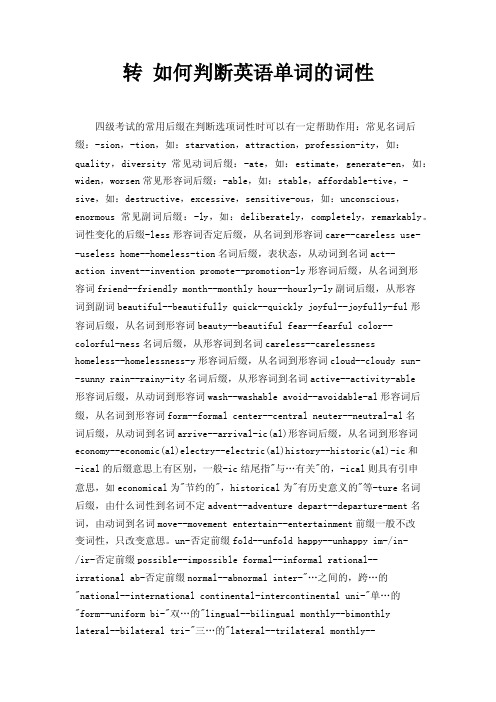
转如何判断英语单词的词性四级考试的常用后缀在判断选项词性时可以有一定帮助作用:常见名词后缀:-sion,-tion,如:starvation,attraction,profession-ity,如:quality,diversity常见动词后缀:-ate,如:estimate,generate-en,如:widen,worsen常见形容词后缀:-able,如:stable,affordable-tive,-sive,如:destructive,excessive,sensitive-ous,如:unconscious,enormous常见副词后缀:-ly,如:deliberately,completely,remarkably。
词性变化的后缀-less形容词否定后缀,从名词到形容词care--careless use--useless home--homeless-tion名词后缀,表状态,从动词到名词act--action invent--invention promote--promotion-ly形容词后缀,从名词到形容词friend--friendly month--monthly hour--hourly-ly副词后缀,从形容词到副词beautiful--beautifully quick--quickly joyful--joyfully-ful形容词后缀,从名词到形容词beauty--beautiful fear--fearful color--colorful-ness名词后缀,从形容词到名词careless--carelessnesshomeless--homelessness-y形容词后缀,从名词到形容词cloud--cloudy sun--sunny rain--rainy-ity名词后缀,从形容词到名词active--activity-able形容词后缀,从动词到形容词wash--washable avoid--avoidable-al形容词后缀,从名词到形容词form--formal center--central neuter--neutral-al名词后缀,从动词到名词arrive--arrival-ic(al)形容词后缀,从名词到形容词economy--economic(al)electry--electric(al)history--historic(al)-ic和-ical的后缀意思上有区别,一般-ic结尾指"与…有关"的,-ical则具有引申意思,如economical为"节约的",historical为"有历史意义的"等-ture名词后缀,由什么词性到名词不定advent--adventure depart--departure-ment名词,由动词到名词move--movement entertain--entertainment前缀一般不改变词性,只改变意思。
单词后缀大全及规律

单词后缀大全及规律单词后缀是指附加在单词末尾以改变其含义或词性的字母或字母组合。
单词后缀有很多种,它们可以分为名词后缀、动词后缀、形容词后缀和副词后缀等。
下面我将从这几个方面来介绍一些常见的单词后缀及其规律。
1. 名词后缀。
-tion, -sion,表示“状态、行为或结果”,如nation (国家)、discussion(讨论)。
-ment,表示“行为或结果”,如enjoyment(享受)、development(发展)。
-ity,表示“性质或状态”,如beauty(美丽)、creativity(创造力)。
2. 动词后缀。
-ize, -ise,表示“使...”,如organize(组织)、realize(意识到)。
-ate,表示“使得...”,如activate(激活)、participate(参与)。
-en,表示“使...变得”,如lengthen(延长)、strengthen(加强)。
3. 形容词后缀。
-ful,表示“充满...的”,如beautiful(美丽的)、graceful(优雅的)。
-ous,表示“有...特征的”,如famous(著名的)、curious(好奇的)。
-able, -ible,表示“可以...的”,如comfortable(舒适的)、visible(可见的)。
4. 副词后缀。
-ly,表示“以...方式”,如quickly(迅速地)、happily(快乐地)。
-ward, -wards,表示“朝向”,如backward(向后地)、onwards(向前地)。
以上是一些常见的单词后缀及其规律,它们可以帮助我们理解单词的构词规律,从而更好地掌握和运用英语词汇。
当我们了解这些后缀的含义和用法后,就能更准确地理解和运用单词,提高语言表达能力。
希望这些信息能够对你有所帮助。
通过词缀判断词性

realistic, poetic, historic -ant ignorant, significant -ly friendly, lively, daily -al critical, accidental, additional -y rainy, handy, thirsty -ent different, dependent, obedient -ary, imaginary, revolutionary, secondary -some tiresome, awesome -en golden, wooden, woolen
表示形容词
-ful
cheerful, grateful, faithful -less careless, homeless, fearless -ish childish, selfish -ive active, destructive -ous courageous, famous, continuous -able agreeable, comfortable -ible sensible, responsible
-ant inhabitant, contestant, dependant -ism socialism, racism, optimism -ness illness, happiness, greatness -(a)tion dictation, preparation, repetition -ment movement, development, judgement -ion expansion, discussion, decision -ing building, feeling, painting
(完整版)根据单词后缀判断词性

1)具有某种职业或动作的人1)—an, —ain,表示”……地方的人,精通……的人”American, historian,2)-al,表示"具有……职务的人" principal,3)-ant,—ent, 表示"……者” merchant,agent,servant,student,4)-ar, 表示"……的人” scholar,liar,peddler5)-ard, —art,表示”做……的人"coward,laggard, braggart (夸张者)6)—arian,表示”……派别的人,……主义的人"humanitarian, vegetarian7)-ary, 表示"从事……的人" secretary,missionary8)—ant,表示"具有……职责的人” candidate,graduate9)—ator,表示"做……的人" educator, speculator(投机者)10)-crat, 表示”某种政体,主义的支持者” democrat,bureaucrat11)-ee, 表示"动作承受者” employee,examinee12)-eer, 表示”从事于……人" engineer,volunteer13)—er,表示”从事某种职业的人,某地区,地方的人” banker,observer, Londoner, villager14)-ese,表示” ……国人,…。
.地方的人”Japanese,Cantonese15)—ess,表示”阴性人称名词,actress,hostess, manageress16)-eur,表示"……家” amateur,littérateur17)-ian, 表示"……地方人,信仰……。
教的人,从事……职业的人”Christian, physician(内科医生),musician18)-ician, 表示”精通者,……家,"electrician, magician,technician19)—icist, 表示”……家,……。
英语词汇学通过后缀判断词性

-ant 形容词:ignorant, assistant辅助的, 副的, attendant伴随的, 随之而产生的 buoyant----buoy(浮标,救生圈) + ant----有浮 力的, 轻快的
名词:examinant主考官, applicant申请者, servant, participant attendant服务人员
-ent 形容词:existent, dependent, emergent 名词: resident, patient, solvent溶剂, detergent洗洁精,去污剂 -ic 形容词:periodic, cubic立方形的, 立方体的, magnetic磁性的, electronic 名词:critic评论者、批评家, mechanic技工、 机械师, logic逻辑, rhetoric 修辞学
-ine 形容词:feminine女性的、阴柔的, nervine 神 经的, riverine 河流的 名词:heroine,doctrine教义,routine程序、 常规, concubine妾 -ar 形容词:familiar, similar, linear线性的, peculiar 奇特的 名词:scholar学者, liar说谎者, peddler小贩子, 毒贩 burglar夜贼
具有三种词性的后缀
- ly 同 时 具 有 副 词 , 名 词 与 形 容 词 副词:namely, similarly, badly严重的、恶劣的 形容词:weekly, friendly, homely, costly 名词:weekly周刊,monthly月刊,quarterly季 刊
2013-8-23
~logical表示学科的, eg:biological
名词性形容词性和副词性的后缀

名词性,形容词性和副词性的后缀一、名词性后缀1,-age为抽象名词后缀,表示行为,状态和全体总称pe rcentage百分数,百分率,voltage电压,伏特数,la vage灌洗,洗,出法,gava ge管词法,cu rettage刮除法,short age不足,缺少。
2,-cy表示抽象名词accuracy准确,精确度,infancy婴儿期。
3,-ence、-an ce表示性质和动作diffe rence不同,interfer ence干扰,干预,influe nce影响,感化,occurre nce发出,出现,violenc e 激烈,暴力,e xistence存在,signi ficance意义,意味。
4,-ency、-ancy抽象名词后缀diff iciency不足,不全,ten dency趋势,趋向,frequ ency频率,p regnancy妊娠,emerg ency 紧急,急救,fluenc y流利,流畅,s ufficien cy足够,充足,constanc y坚定,经久不变。
5,-er表示…人、…者diamete r直径,rece iver接收者,接受者,carr ier 携带者,beginner初学者,创始人,reader读者,shutter快门,goit er甲状腺肿。
6,-ics表示…科学p sdiatric s儿科学,psy chiatric s精神病学,ob stetrics产科学,orth opdics矫形科学,auris trics 耳科学,gnathos tomatics口腔生理学,an driatric s男性医学,男性科。
7,-i an表示人称名词physic ian医师,内科医师,techn ician技术员8,-ica tion 由动词变化而来的抽象名词,常译为…化simplif fcation简化,calci fication钙化,class ificatio n分类,分级,communic ation交流,交往。
名词性,形容词性和副词性的后缀
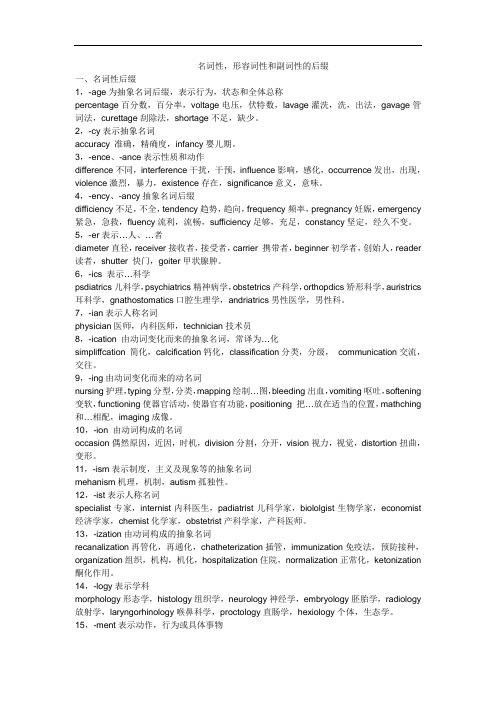
名词性,形容词性和副词性的后缀一、名词性后缀1,-age为抽象名词后缀,表示行为,状态和全体总称percentage百分数,百分率,voltage电压,伏特数,lavage灌洗,洗,出法,gavage管词法,curettage刮除法,shortage不足,缺少。
2,-cy表示抽象名词accuracy 准确,精确度,infancy婴儿期。
3,-ence、-ance表示性质和动作difference不同,interference干扰,干预,influence影响,感化,occurrence发出,出现,violence激烈,暴力,existence存在,significance意义,意味。
4,-ency、-ancy抽象名词后缀difficiency不足,不全,tendency趋势,趋向,frequency频率,pregnancy妊娠,emergency 紧急,急救,fluency流利,流畅,sufficiency足够,充足,constancy坚定,经久不变。
5,-er表示…人、…者diameter直径,receiver接收者,接受者,carrier 携带者,beginner初学者,创始人,reader 读者,shutter 快门,goiter甲状腺肿。
6,-ics 表示…科学psdiatrics儿科学,psychiatrics精神病学,obstetrics产科学,orthopdics矫形科学,auristrics 耳科学,gnathostomatics口腔生理学,andriatrics男性医学,男性科。
7,-ian表示人称名词physician医师,内科医师,technician技术员8,-ication 由动词变化而来的抽象名词,常译为…化simpliffcation 简化,calcification钙化,classification分类,分级,communication交流,交往。
9,-ing由动词变化而来的动名词nursing护理,typing分型,分类,mapping绘制…图,bleeding出血,vomiting呕吐,softening 变软,functioning使器官活动,使器官有功能,positioning 把…放在适当的位置,mathching 和…相配,imaging成像。
- 1、下载文档前请自行甄别文档内容的完整性,平台不提供额外的编辑、内容补充、找答案等附加服务。
- 2、"仅部分预览"的文档,不可在线预览部分如存在完整性等问题,可反馈申请退款(可完整预览的文档不适用该条件!)。
- 3、如文档侵犯您的权益,请联系客服反馈,我们会尽快为您处理(人工客服工作时间:9:00-18:30)。
-ic 形容词:periodic, cubic立方形的, 立方体的, magnetic磁性的, electronic 名词:critic评论者、批评家, mechanic技工、机 械师, logic逻辑, rhetoric 修辞学
1.具有名词与形容词两种词性的后缀
-ile 形容词 fertile 肥沃的 juvenile 年轻的 fragile 易碎的
名词 Missile---导弹 Textile---纺织品 Automobile
2.同时具有形容词与动词含义的后缀-ish
1. 形容词 1)具有...性质的(通常为贬义) bookish书呆子气的 辨析:childish, childly, childlike manish, manly, manlike 2)稍微的 coldish微冷的, yellowish偏黄的 3)语言 English, Finish, Spanish 2. 动词 establish, diminish使缩小,vanish消失, flourish使 繁荣,使兴旺
eg: society policy storage entrance confidence librarian employee scientist history wisdom actress economics building adventure Marxism
~ian,~ist 表示专业人士, eg:musician,scientist
~er表示占主动地位的人,eg:employer
~ee表站被动地位的人, eg:employee
~ess表示雌性的人或动物,eg:tigeress,actress
~ese表示国籍和语言, eg:chinese ~ics和~logy表示学科 eg: physics biology ~ing表示行业, eg:banking
-tive 形容词:active, passive, positive, negative 名词:detective, representative代表、代表的, relative亲戚, 相关的 例句:Success is a relative term, it brings so many relatives. ----by Bernard Shaw 含义是:一人得道,鸡犬升天。
形容词: 以 able, ous, tic, ful, al, ible, tive, less, like, logical, most, proof, some 结尾 形容词后缀: ~able和~ible表示可以,能够, eg:eatable ~less表示否定, eg:homeless
~like表示像, eg:humanlike
1.具有名词与形容词两种词性的后缀
-ine 形容词:feminine女性的、阴柔的, riverine 河流的 名词:heroine女主角,doctrine教义,routine程 序、常规
-ar 形容词:familiar, similar, linear线性的, peculiar 奇特的 名词:scholar学者, liar说谎者, peddler小贩子,毒 贩 burglar夜贼
~ling表示小的意思, eg:birdling 幼鸟 ~ism表示主义, eg:realism
~ry表示...类, eg:jewelry -都属于不可数名词
1.具有名词与形容词两种词性的后缀
-al 形容词:personal, parental, natural 名词:refusal, proposal, approval, denial, survival, trial
14
1.具有名词与形容词两种词性的后缀
-ant 形容词:ignorant, assistant辅助的, 副的, attendant伴随的, 随之而产生的
名词:examinant主考官, applicant申请者, servant, participant attendant服务人员
1.具有名词与形容词两种词性的后:advisory忠告的, contradictory矛盾的, imaginary虚构的, elementary初级的 名词: inventory库存目录 dormitory宿舍 observatory 天文台 laboratory 实验室 lavatory 盥洗室 dictionary
通过词缀判断词性
动词: 以 en, fy, ize, ate 结尾的词一般都是动词 如 shorten, terrify, realize, maturate 副词: 以 ly 结尾的词大多是副词 (除 friendly, costly, deadly, monthly, weekly, yearly, daily 外 这些词都是形容词) -wise:clock→clockwise(a./adv.)顺时针方向的(地); like→likewise同样地 -wards:out→outwards向外面地, north→northwards向北方地
3. 具有三种词性的后缀
-ly同时具有副词,名词与形容词 副词:namely, similarly, badly严重的、恶劣的 形容词:weekly, friendly, homely, costly 名词:weekly周刊,monthly月刊,quarterly季刊
2014-12-7
~logical表示学科的, eg:biological ~proof表示防...的, eg:fireproof, waterproof ~most表示最...的, eg:easternmost
名词: 以 ty, cy , age, ance, ence, ian, er, ee, ist, ry, or, dom, ess, ese, tion, hood, ics, ing, ism, ling, logy, ment, ness, ship, sion, ture 结 尾
